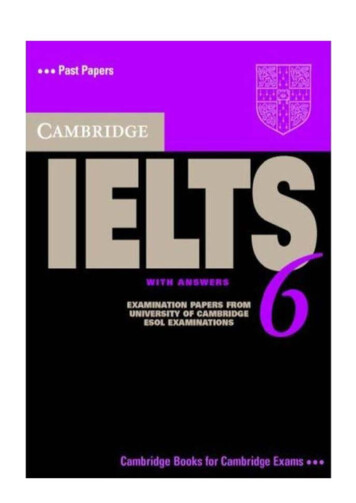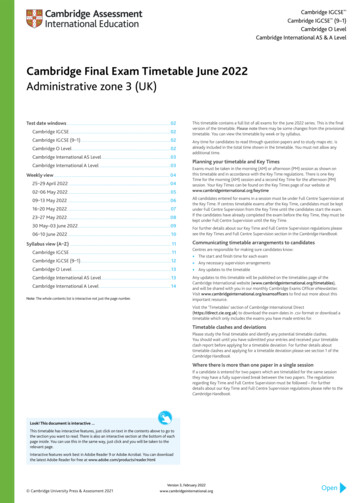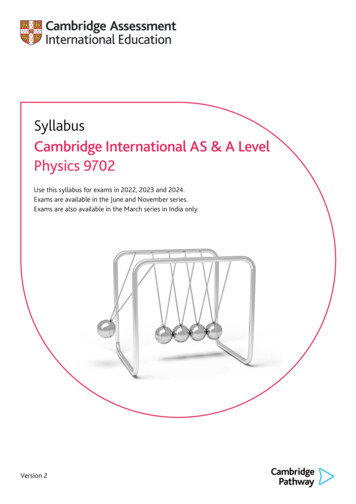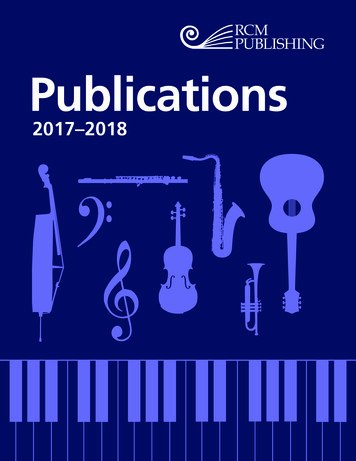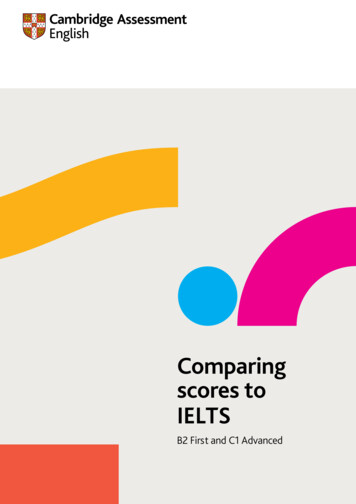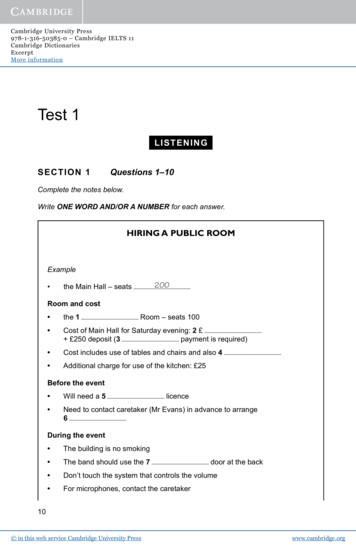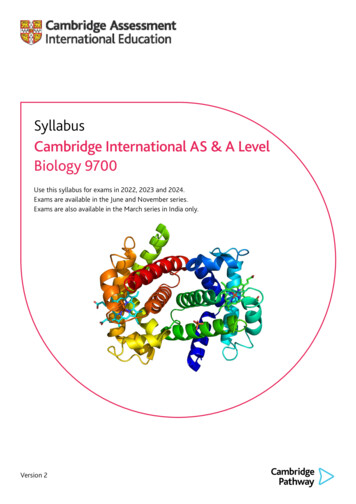
Transcription
SyllabusCambridge International AS & A LevelBiology 9700Use this syllabus for exams in 2022, 2023 and 2024.Exams are available in the June and November series.Exams are also available in the March series in India only.Version 2
Why choose Cambridge International?Cambridge International prepares school students for life, helping them develop an informed curiosity and a lastingpassion for learning. We are part of the University of Cambridge.Our Cambridge Pathway gives students a clear path for educational success from age 5 to 19. Schools can shapethe curriculum around how they want students to learn – with a wide range of subjects and flexible ways to offerthem. It helps students discover new abilities and a wider world, and gives them the skills they need for life, so theycan achieve at school, university and work.Our programmes and qualifications set the global standard for international education. They are created by subjectexperts, rooted in academic rigour and reflect the latest educational research. They provide a strong platform forstudents to progress from one stage to the next, and are well supported by teaching and learning resources.We review all our syllabuses regularly, so they reflect the latest research evidence and professional teachingpractice – and take account of the different national contexts in which they are taught.We consult with teachers to help us design each syllabus around the needs of their learners. Consulting withleading universities has helped us make sure our syllabuses encourage students to master the key concepts in thesubject and develop the skills necessary for success in higher education.Our mission is to provide educational benefit through provision of international programmes and qualifications forschool education and to be the world leader in this field. Together with schools, we develop Cambridge learnerswho are confident, responsible, reflective, innovative and engaged – equipped for success in the modern world.Every year, nearly a million Cambridge students from 10 000 schools in 160 countries prepare for their future withthe Cambridge Pathway.‘We think the Cambridge curriculum is superb preparation for university.’Christoph Guttentag, Dean of Undergraduate Admissions, Duke University, USAQuality managementCambridge International is committed to providing exceptional quality. In line with this commitment, ourquality management system for the provision of international qualifications and education programmes forstudents aged 5 to 19 is independently certified as meeting the internationally recognised standard,ISO 9001:2015. Learn more at www.cambridgeinternational.org/ISO9001Copyright UCLES September 2019Cambridge Assessment International Education is part of the Cambridge Assessment Group. Cambridge Assessment is the brand name ofthe University of Cambridge Local Examinations Syndicate (UCLES), which itself is a department of the University of Cambridge.UCLES retains the copyright on all its publications. Registered centres are permitted to copy material from this booklet for their owninternal use. However, we cannot give permission to centres to photocopy any material that is acknowledged to a third party even forinternal use within a centre.
Contents1 Why choose this syllabus? .22 Syllabus overview . 6Aims6Content overview7Assessment overview8Assessment objectives103 Subject content .12AS Level subject content12A Level subject content294 Details of the assessment .44Paper 1 Multiple Choice44Paper 2 AS Level Structured Questions44Paper 3 Advanced Practical Skills44Paper 4 A Level Structured Questions44Paper 5 Planning, Analysis and Evaluation44Command words455 Practical assessment.46Introduction46Paper 3 Advanced Practical Skills46Paper 5546 Additional information. 58Mathematical requirements58Mathematical formulae (A Level only)60Notes on the use of statistics in Biology (A Level only)627 What else you need to know . 63Before you start63Making entries64After the exam65How students, teachers and higher education can use the grades66Grade descriptions66Changes to this syllabus for 2022, 2023 and 202467Changes to this syllabusFor information about changes to this syllabus for 2022, 2023 and 2024, go to page 67.
Cambridge International AS & A Level Biology 9700 syllabus for 2022, 2023 and 2024.1 Why choose this syllabus?Key benefitsThe best motivation for a student is a real passion for the subjectthey’re learning. By offering students a variety of CambridgeInternational AS & A Levels, you can give them the greatest chanceof finding the path of education they most want to follow. Withover 50 subjects to choose from, students can select the onesthey love and that they’re best at, which helps motivate themthroughout their studies.Following a Cambridge International AS & A Level programmehelps students develop abilities which universities value highly,including: a deep understanding of their subjects higher order thinking skills – analysis, critical thinking,problem solving presenting ordered and coherent arguments independent learning and research.Cambridge International AS & A Level Biology develops a set of transferable skills including handling data,practical problem-solving, and applying the scientific method. Learners develop relevant attitudes, such asconcern for accuracy and precision, objectivity, integrity, enquiry, initiative and inventiveness. They acquire theessential scientific skills required for progression to further studies or employment.Our approach in Cambridge International AS & A Level Biology encourages learners to be:confident, secure in their knowledge, keen to explore further and able to communicate effectively through thelanguage of scienceresponsible, developing efficient and safe scientific practices and working collaboratively with othersreflective, able to evaluate evidence to draw informed and appropriate conclusions and recognising that theapplications of science have the potential to affect the individual, the community and the environmentinnovative, applying problem-solving skills to novel situations and engaging with new tools and techniques,including information technology, to develop successful approachesengaged, developing an enquiring mind, keen to apply scientific skills in everyday life.‘Cambridge students develop a deep understanding of subjects and independent thinking skills.’Principal, Rockledge High School, USA2www.cambridgeinternational.org/alevelBack to contents page
Cambridge International AS & A Level Biology 9700 syllabus for 2022, 2023 and 2024. Why choose this syllabus?Key conceptsKey concepts are essential ideas that help students develop a deep understanding of their subject and make linksbetween different aspects. Key concepts may open up new ways of thinking about, understanding or interpretingthe important things to be learned.Good teaching and learning will incorporate and reinforce a subject’s key concepts to help students gain: a greater depth as well as breadth of subject knowledge confidence, especially in applying knowledge and skills in new situations the vocabulary to discuss their subject conceptually and show how different aspects link together a level of mastery of their subject to help them enter higher education.The key concepts identified below, carefully introduced and developed, will help to underpin the course you willteach. You may identify additional key concepts which will also enrich teaching and learning.The key concepts for Cambridge International AS & A Level Biology are: Cells as the units of lifeA cell is the basic unit of life and all organisms are composed of one or more cells. There are two fundamentaltypes of cell: prokaryotic and eukaryotic. Understanding how cells work provides an insight into thefundamental processes of all living organisms. Biochemical processesCells are dynamic structures within which the chemistry of life takes place. Biochemistry and molecular biologyhelp to explain how and why cells function as they do. DNA, the molecule of heredityCells contain the molecule of heredity, DNA. DNA is essential for the continuity and evolution of life byallowing genetic information to be stored accurately, to be copied to daughter cells, to be passed from onegeneration to the next and for the controlled production of proteins. Rare errors in the accurate copying ofDNA known as mutations result in genetic variation and are essential for evolution. Natural selectionNatural selection acts on genetic variation and is the major mechanism in evolution, including speciation.Natural selection results in the accumulation of beneficial genetic mutations within populations and explainshow populations can adapt to meet the demands of changing environments. Organisms in their environmentAll organisms interact with their biotic and abiotic environment. Studying these interactions allows biologiststo understand better the effect of human activities on ecosystems, to develop more effective strategies toconserve biodiversity and to predict more accurately the future implications for humans of changes in thenatural world. Observation and experimentThe different fields of biology are intertwined and cannot be studied in isolation. Observation, enquiry,experimentation and fieldwork are fundamental to biology, allowing relevant evidence to be collected andconsidered as a basis on which to build new models and theories. Such models and theories are furthertested by experimentation and observation in a cyclical process of feedback and refinement, allowing thedevelopment of robust and evidence-based conceptual understandings.Back to contents pagewww.cambridgeinternational.org/alevel3
Cambridge International AS & A Level Biology 9700 syllabus for 2022, 2023 and 2024. Why choose this syllabus?International recognition and acceptanceOur expertise in curriculum, teaching and learning, and assessment is the basis for the recognition of ourprogrammes and qualifications around the world. Every year thousands of students with Cambridge InternationalAS & A Levels gain places at leading universities worldwide. They are valued by top universities around the worldincluding those in the UK, US (including Ivy League universities), Europe, Australia, Canada and New Zealand.UK NARIC, the national agency in the UK for the recognition and comparison of international qualifications andskills, has carried out an independent benchmarking study of Cambridge International AS & A Level and found it tobe comparable to the standard of AS & A Level in the UK. This means students can be confident that their CambridgeInternational AS & A Level qualifications are accepted as equivalent, grade for grade, to UK AS & A Levels by leadinguniversities worldwide.Cambridge International AS Level Biology makes up the first half of the Cambridge International A Level coursein biology and provides a foundation for the study of biology at Cambridge International A Level. Depending onlocal university entrance requirements, students may be able to use it to progress directly to university courses inbiology or some other subjects. It is also suitable as part of a course of general education.Cambridge International A Level Biology provides a foundation for the study of biology or related courses in highereducation. Equally it is suitable as part of a course of general education.For more information about the relationship between the Cambridge International AS Level and CambridgeInternational A Level see the ‘Assessment overview’ section of the Syllabus overview.We recommend learners check the Cambridge recognitions database and the university websites to find the mostup-to-date entry requirements for courses they wish to study.Learn more at e Assessment International Education is an education organisation and politically neutral. Thecontent of this syllabus, examination papers and associated materials do not endorse any political view. Weendeavour to treat all aspects of the exam process neutrally.‘The depth of knowledge displayed by the best A Level students makes them prime targets forAmerica’s Ivy League universities’Yale University, USA4www.cambridgeinternational.org/alevelBack to contents page
Cambridge International AS & A Level Biology 9700 syllabus for 2022, 2023 and 2024. Why choose this syllabus?Supporting teachersWe provide a wide range of practical resources, detailed guidance, and innovative training and professionaldevelopment so that you can give your students the best possible preparation for Cambridge InternationalAS & A Level.Teaching resourcesExam preparation resources School Support Hubwww.cambridgeinternational.org/support Question papers Syllabuses Schemes of work Example candidate responses to understandwhat examiners are looking for at key grades Learner guides Examiner reports to improve future teaching Mark schemes Discussion forums Endorsed resourcesTraining Introductory – face-to-face or online Extension – face-to-face or online Enrichment – face-to-face or online Coursework – online Cambridge Professional DevelopmentQualificationsSupportfor CambridgeInternationalAS & A LevelCommunityYou can find useful information, as well asshare your ideas and experiences with otherteachers, on our social media channels andcommunity forums.Find out more atwww.cambridgeinternational.org/social-mediaFind out more ge International AS & A Levels prepare students well for university because they’velearnt to go into a subject in considerable depth. There’s that ability to really understand thedepth and richness and the detail of a subject. It’s a wonderful preparation for what they aregoing to face at university.’US Higher Education Advisory CouncilBack to contents pagewww.cambridgeinternational.org/alevel5
Cambridge International AS & A Level Biology 9700 syllabus for 2022, 2023 and 2024.2 Syllabus overviewAimsThe aims describe the purposes of a course based on this syllabus.The aims are to enable students to:6 acquire knowledge and understanding and develop practical skills, including efficient, accurate and safescientific practices learn to apply the scientific method, while developing an awareness of the limitations of scientific theories andmodels develop skills in data analysis, evaluation and drawing conclusions, cultivating attitudes relevant to sciencesuch as objectivity, integrity, enquiry, initiative and inventiveness develop effective scientific communication skills, using appropriate terminology and scientific conventions understand their responsibility to others/society and to care for the environment enjoy science and develop an informed interest in the subject that may lead to further study.www.cambridgeinternational.org/alevelBack to contents page
Cambridge International AS & A Level Biology 9700 syllabus for 2022, 2023 and 2024. Syllabus overviewContent overviewCandidates for Cambridge International AS Level Biology study the following topics:1Cell structure2Biological molecules3Enzymes4Cell membranes and transport5The mitotic cell cycle6Nucleic acids and protein synthesis7Transport in plants8Transport in mammals9Gas exchange10 Infectious diseases11 ImmunityAS Level candidates also study practical skills.Candidates for Cambridge International A Level Biology study the AS topics and the following topics:12 Energy and respiration13 Photosynthesis14 Homeostasis15 Control and coordination16 Inheritance17 Selection and evolution18 Classification, biodiversity and conservation19 Genetic technologyA Level candidates also study practical skills.Support for Cambridge International AS & A Level BiologyThe School Support Hub is our secure online site for Cambridge teachers where you can find the resourcesyou need to deliver our programmes, including schemes of work, past papers, mark schemes and examinerreports. You can also keep up to date with your subject and the global Cambridge community through ouronline discussion forums.www.cambridgeinternational.org/supportBack to contents pagewww.cambridgeinternational.org/alevel7
Cambridge International AS & A Level Biology 9700 syllabus for 2022, 2023 and 2024. Syllabus overviewAssessment overviewPaper 1Multiple ChoicePaper 41 hour 15 minutesA Level Structured Questions2 hours40 marks100 marks40 multiple-choice questionsStructured questionsQuestions are based on the AS Level syllabuscontent.Externally assessedQuestions are based on the A Level syllabuscontent; knowledge of material from the ASLevel syllabus content will be required.31% of the AS LevelExternally assessed15.5% of the A Level38.5% of the A LevelPaper 2Paper 5AS Level StructuredQuestions1 hour 15 minutesPlanning, Analysis andEvaluation1 hour 15 minutes60 marks30 marksStructured questionsQuestions are based on the practical skills ofplanning, analysis and evaluation.Questions are based on the AS Level syllabuscontent.Externally assessedThe context of the questions may be outsidethe syllabus content.Externally assessed46% of the AS Level11.5% of the A Level23% of the A LevelPaper 3Advanced Practical Skills2 hours40 marksPractical work and structured questionsQuestions are based on the practical skillsin the Practical assessment section of thesyllabus.The context of the questions may be outsidethe syllabus content.Externally assessed23% of the AS Level11.5% of the A LevelInformation on availability is in the Before you start section.8www.cambridgeinternational.org/alevelBack to contents page
Cambridge International AS & A Level Biology 9700 syllabus for 2022, 2023 and 2024. Syllabus overviewThere are three routes for Cambridge International AS & A Level Biology:Route12Paper 1Paper 2Paper 3AS Level only(Candidates take all AS componentsin the same exam series) A Level (staged over two years)Year 1 AS Level* Year 2 Complete the A Level3A Level(Candidates take all components inthe same exam series) Paper 4Paper 5 * Candidates carry forward their AS Level result subject to the rules and time limits described in the Cambridge Handbook.Candidates following an AS Level route will be eligible for grades a–e. Candidates following an A Level route areeligible for grades A*–E.Back to contents pagewww.cambridgeinternational.org/alevel9
Cambridge International AS & A Level Biology 9700 syllabus for 2022, 2023 and 2024. Syllabus overviewAssessment objectivesThe assessment objectives (AOs) are:AO1 Knowledge and understandingCandidates should be able to demonstrate knowledge and understanding of: scientific phenomena, facts, laws, definitions, concepts and theories scientific vocabulary, terminology and conventions (including symbols, quantities and units) scientific instruments and apparatus, including techniques of operation and aspects of safety scientific quantities and their determination scientific and technological applications with their social, economic and environmental implications.AO2 Handling, applying and evaluating informationCandidates should be able to handle, apply and evaluate information, in words or using other forms of presentation(e.g. symbols, graphical or numerical) to: locate, select, organise and present information from a variety of sources translate information from one form to another manipulate numerical and other data use information to identify patterns, report trends and draw conclusions give reasoned explanations for phenomena, patterns and relationships make predictions and construct arguments to support hypotheses apply knowledge, including principles, to new situations evaluate information and hypotheses demonstrate an awareness of the limitations of biological theories and models solve problems.AO3 Experimental skills and investigationsCandidates should be able to:10 plan experiments and investigations collect, record and present observations, measurements and estimates analyse and interpret experimental data to reach conclusions evaluate methods and quality of experimental data and suggest possible improvements to ack to contents page
Cambridge International AS & A Level Biology 9700 syllabus for 2022, 2023 and 2024. Syllabus overviewWeighting for assessment objectivesThe approximate weightings allocated to each of the assessment objectives (AOs) are summarised below.Assessment objectives as a percentage of each qualificationAssessment objectiveWeighting in AS Level %Weighting in A Level %AO1 Knowledge and understanding4040AO2 Handling, applying and evaluating information4040AO3 Experimental skills and investigations2020Total100100Assessment objectives as a percentage of each componentAssessment objectiveWeighting in components %Paper 1Paper 2Paper 3Paper 4Paper 5AO1 Knowledge and understanding50500500AO2 Handling, applying and evaluating information50500500AO3 Experimental skills and investigations001000100100100100100100TotalBack to contents pagewww.cambridgeinternational.org/alevel11
Cambridge International AS & A Level Biology 9700 syllabus for 2022, 2023 and 2024.3 Subject contentCandidates for Cambridge International AS Level should study topics 1–11.Candidates for Cambridge International A Level should study all topics.The AS Level learning outcomes are assumed knowledge for the A Level components.Teachers should refer to the social, environmental, economic and technological aspects of biology whereverpossible throughout the syllabus. Some examples are included in the syllabus and teachers should encouragelearners to apply the principles of these examples to other situations introduced in the course.Teachers should illustrate concepts and content with examples taken from a wide range of organisms.Everything we know about biology has been learned through practical investigation. Learners also find practicalwork motivating and interesting, and it can help them to understand abstract theoretical concepts. CambridgeInternational expects that practical activities will underpin the teaching of the whole syllabus.The syllabus content for practical skills is in the Practical assessment section.Teachers should ensure that candidates are prepared for the assessment of theory learning outcomes and practicalskills.This syllabus gives you the flexibility to design a course that will interest, challenge and engage your learners.Where appropriate you are responsible for selecting suitable subject contexts, resources and examples to supportyour learners' study. These should be appropriate for the learners' age, cultural background and learning context aswell as complying with your school policies and local legal requirements.AS Level subject content1Cell structureAll organisms are composed of cells. Knowledge of the structure and function of cells underpins much of biology.The fundamental differences between eukaryotic and prokaryotic cells are explored and provide useful biologicalbackground for the topic on Infectious diseases (Topic 10). Viruses are introduced as non-cellular structures,which gives candidates the opportunity to consider whether cells are the basic unit of life.The use of light microscopes is a fundamental skill that is developed in this topic and applied throughout severalother topics of the syllabus.1.1 The microscope in cell ning outcomesCandidates should be able to:1make temporary preparations of cellular material suitable forviewing with a light microscope2draw cells from microscope slides and photomicrographs3calculate magnifications of images and actual sizes ofspecimens from drawings, photomicrographs and electronmicrographs (scanning and transmission)4use an eyepiece graticule and stage micrometer scale to makemeasurements and use the appropriate units, millimetre (mm),micrometre (µm) and nanometre (nm)5define resolution and magnification and explain the differencesbetween these terms, with reference to light microscopy andelectron microscopyBack to contents page
Cambridge International AS & A Level Biology 9700 syllabus for 2022, 2023 and 2024. Subject content1.2 Cells as the basic units of livingorganismsLearning outcomesCandidates should be able to:1Back to contents pagerecognise organelles and other cell structures found ineukaryotic cells and outline their structures and functions,limited to: cell surface membrane nucleus, nuclear envelope and nucleolus rough endoplasmic reticulum smooth endoplasmic reticulum Golgi body (Golgi apparatus or Golgi complex) mitochondria (including the presence of small circular DNA) ribosomes (80S in the cytoplasm and 70S in chloroplastsand mitochondria) lysosomes centrioles and microtubules cilia microvilli chloroplasts (including the presence of small circular DNA) cell wall plasmodesmata large permanent vacuole and tonoplast of plant cells2describe and interpret photomicrographs, electron micrographsand drawings of typical plant and animal cells3compare the structure of typical plant and animal cells4state that cells use ATP from respiration for energy-requiringprocesses5outline key structural features of a prokaryotic cell as found in atypical bacterium, including: unicellular generally 1–5 µm diameter peptidoglycan cell walls circular DNA 70S ribosomes absence of organelles surrounded by double membranes6compare the structure of a prokaryotic cell as found in a typicalbacterium with the structures of typical eukaryotic cells inplants and animals7state that all viruses are non-cellular structures with a nucleicacid core (either DNA or RNA) and a capsid made of protein,and that some viruses have an outer envelope made el13
Cambridge International AS & A Level Biology 9700 syllabus for 2022, 2023 and 2024. Subject content2Biological moleculesThis topic introduces carbohydrates, lipids and proteins: organic molecules that are important in cells. Nucleicacids, another class of biological molecule, are covered in Topic 6. All of these molecules are based on theversatile element carbon. This topic explains how carbohydrates, lipids and proteins, which have a great diversityof function in organisms, are assembled from smaller organic molecules such as glucose, amino acids, glyceroland fatty acids.The emphasis in this topic is on the relationship between molecular structures and their functions. Some of theseideas are continued in other topics, for example, the functions of haemoglobin in gas transport in Transport inmammals (Topic 8), phospholipids in membranes in Cell membranes and transport (Topic 4) and antibodies inImmunity (Topic 11).Life as we know it would not be possible without water. Understanding the properties of this extraordinarymolecule is an essential part of any study of biological molecules. Some of the roles of water are in this topic,others are in Topics 4, 7, 8, 12, 13 and 14.2.1 Testing for biological molecules2.2 Carbohydrates and ing outcomesCandidates should be able to:1describe and carry out the Benedict’s test for reducing sugars,the iodine test for starch, the emulsion test for lipids and thebiuret test for proteins2describe and carry out a semi-quantitative Benedict’s test ona reducing sugar solution by standardising the test and usingthe results (time to first colour change or comparison to colourstandards) to estimate the concentration3describe and carry out a test to identify the presence ofnon-reducing sugars, using acid hydrolysis and Benedict’ssolutionLearning outcomesCandidates should be able to:1describe and draw the ring forms of α-glucose and β-glucose2define the terms monomer, polymer, macromolecule,monosaccharide, disaccharide and polysaccharide3state the role of covalent bonds in joining smaller moleculestogether to form polymers4state that glucose, fructose and maltose are reducing sugars andthat sucrose is a non-reducing sugar5describe the formation of a glycosidic bond by condensation,with reference to disaccharides, including sucrose, andpolysaccharidescontinuedBack to contents page
Cambridge International AS & A Level Biology 9700 syllabus for 2022, 2023 and 2024. Subject content2.2 Carbohydrates and lipidscontinuedLearning outcomesCandidates should be able to:6describe the breakage of a glycosidic bond in polysaccharidesand disaccharides by hydrolysis, with reference to thenon-reducing sugar test7describe the molecular structure of the polysaccharides starch(amylose and amylopectin) and glycogen and relate theirstructures to their functions in living organisms8describe the molecular structure of the polysaccharide celluloseand outline how the arrangement of cellulose moleculescontributes to the function of plant cell walls9state that triglycerides are non-polar hydrophobic moleculesand describe the molecular structure of triglycerides withreference to fatty acids (saturated and unsaturated), glyceroland the formation of ester bonds10 relate the molecular structure of triglycerides to their functionsin living organisms11 describe the molecular structure of phospholipids with referenceto their hydrophilic (polar) phosphate
Biology 9700 Use this syllabus for exams in 2022, 2023 and 2024. Exams are available in the June and November series. Exams are also available in the March series in India only. Why choose Cambridge International? Cambridge International prepares school students for life, helping them develop an informed curiosity and a lasting
